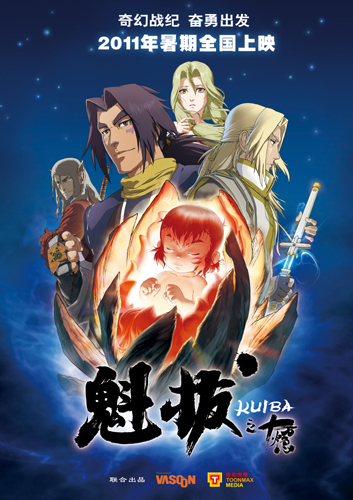'Kuiba' sets Chinese animation on new path
- By Keen Zhang
 0 Comment(s)
0 Comment(s) Print
Print E-mail
China.org.cn, June 29, 2011
E-mail
China.org.cn, June 29, 2011
In the past decade I have been fed up by the cartoons that some Chinese production companies have been making due to their lack of sophistication, imagination and creativity. I am constantly disappointed by the boring lecturing, weak storylines and ridiculous character settings. Like other Chinese young adults, I preferred to watch maturely produced features from America and Japan.
Now, everything may change.
I see new hope for Chinese animation in an upcoming film titled "Kuiba".
The 35-million-yuan (US$5.4 million) Chinese animated feature film from veteran Beijing-based television studio Vassoon Animation will be released nationwide on July 8 by the Shanghai Media Group. It is China's latest attempt to showcase its homegrown cartoon talent.
I attended a private viewing of the film last week to witness the history in making. For Chinese people, the story of "Kuiba" is unique but familiar; what's more, the film's release could be a watershed event in the history of Chinese animation.
The plot centers around a monkey-boy named Manji struggling to be a hero, but fighting with his inner demons. Manji's true identity is Kuiba, a destructor who is reborn every 333 years to annihilate the world. During the film's storyline, Manji is reborn but saved from fulfilling his destructive prophecy. He is adopted by a braggart warrior father and raised as normal kid who loves kung fu.
Eight script writers spent six years refining the story, building a completely new fictional world with its own nations and diverse bio-systems, much like the alternate universes created for J.R.R. Tolkien's "Lord of the Rings" or George Lucas's "Star Wars", said Vassoon chairman Wang Chuan, who also directed the film.
"Kuiba" is the first film to be released in a 5-part series. Following this year's release, a new sequel will hit screens every year for the next 4 years, Chuan said. Japan and the United States have shown great interest in the film and have purchased rights to release dubbed Japanese and English versions, according to Vassoon.
However, many viewers who only see the film in Japanese or English might mistake it for a Japanese anime blockbuster. Even the names of characters are not quite Chinese, and the cast includes spiritual beings, humans as well as monsters, like many anime films. They live in an alternative universe designed much like the worlds of Japanese anime.







Go to Forum >>0 Comment(s)